Heathrow airport cancelled half of its flights as the snow and cold weather continued to cause problems across the UK, stranding motorists and leaving roads icy and treacherous.
The travel chaos ensuedon Sunday as the worst of the wintry showers came to an end across the country and forecasters predicted dry conditions and a partial thaw.
Although the snow flurries are now expected to move eastwards, swaths of the UK were on "amber alert" on Sunday, the Met Office's second highest severe weather warning, with icy conditions across much of England, Scotland and Wales.
Church Fenton in North Yorkshire and Wattisham in Suffolk recorded 16cm of snow, while up to 15cm was forecast for parts of Cumbria, Lincolnshire, East Anglia, North Yorkshire, the Peak District and the Midlands.
The icy spell has seen daytime temperatures plummet four or five degrees lower than average for February, traditionally the coldest month of the year.
Heathrow, which had initially cut only 30% of its flights, said the decision was intended to minimise disruption and was made in anticipation of freezing fog.
Although the runways, taxiways and stands had been cleared of snow, only half of the 1,300 scheduled flights went ahead. The London airport, however, said its snow plan had worked "far better" than in previous years, adding that it would operate a normal flight schedule on Monday.
A spokesman said Heathrow, which operates at 99.2% capacity, was "getting back to normal" as it worked to clear the backlog of flights. "We took the decision with airlines and air traffic control yesterday to reduce the flight schedule in advance," he said.
"By cancelling flights in advance airlines have been able to rebook some people on to flights that are departing, and passengers have had better quality information about whether they can fly or not."
Extra staff were being drafted into terminals to help passengers rebook flights, he added.Inbound flights to the airport were also affected, with six transatlantic flights from the US redirected to Shannon airport in Ireland because of the cold snap disruption.
Some were in UK airspace or on approach to London when they were ordered back over to Ireland.
Shannon Airport Authority confirmed arrangements were being made for 400 stranded passengers to stay overnight. The affected routes included Heathrow-bound services from Dallas, Miami, Houston, Washington, Denver and Atlanta.
The transport secretary, Justine Greening, said the authorities at Heathrow were taking the right approach to the problems created by the weather.
"Actually cancelling flights in advance so passengers don't get to the airport and then find their flight being cancelled was one of the main recommendations of the inquiry that Heathrow held into the debacle last year when we saw huge disruption," she told the BBC Sunday Politics programme.
"They are clearly trying to manage the airport and I think the most important thing is making sure that we put safety first. We've got to get planes up into the air and down on to the ground safely.
"That does take a little bit more time to make sure wings are de-iced and that the runways are clear, but over all they're trying to do their best."
The airport came in for heavy criticism following severe weather in December 2010 when Heathrow almost ground to a halt and thousands of passengers were forced to camp overnight in terminals. At the height of the chaos on 19 December, it was able to handle only around 20 flights.
A BAA-commissioned report later concluded the operator's response to the pre-Christmas snow was "initially ineffective" and that the potential impact of the weather had not been fully anticipated in the days before the worst of the snow.
A spokesman for Gatwick said the airport was not experiencing "any major delays" on Sunday and had had to cancel only nine flights. "We're taking a business as usual approach," he added.
Stansted, Birmingham, Luton and Manchester airports were forced to suspend operations for a period on Saturday night as snow piled up on the runways, but normal service was expected to resume on Sunday.
A total of sSix flights were cancelled yesterday in Birmingham, where some passengers were forced to spend the night in thea terminal. But aA spokesman said the airport would catch up todayon Sunday, providing temperatures did not drop too much furtherlower.
In Luton, flights were "fully operational" with some delays due to snow clearing.
A couple of departures were cancelled at Stansted, but a spokesman for the airport said there was "movement" on and off the runway, adding: "Flights are subject to delays of up to about one hour". Although the worst of the snowflurries will move eastwards, swathesswaths of the UK have been placed on amber alert, with the On the roads, motorists faced what the RAC described as a "dangerous cocktail of driving conditions" and were urged to stay at home. Some minor routes were closed altogether. Drivers on sections of the M25 in Hertfordshire were trapped in gridlock throughout the night.
One motorist, Tom Jones, was stranded in his car for more than seven hours. He told the BBC: "We joined the back of a tailback, never realising we would be spending the night on the motorway."
He added that the Highways Agency had to deal with much bad driving, and that he had seen several cars stuck in ditches and many blocking the hard shoulder.
Thames Valley police said the snow had caused a tailback between junctions nine and four southbound on the M40 from about 9pm until the early hours of Sunday.
Police in Kent warned people not to travel unless absolutely essential, and urged people not to cause an obstruction if forced to abandon their vehicles.
The Highways Agency has issued an amber alert, advising people to take extra care while travelling because of "the increased risk of adverse driving conditions".
The AA said it dealt with about 1,500 callouts an hour on Saturday.Rail services have also been affected, with disruption set to continue throughout Sunday.
Southern Railway said trains were subject to delay and cancellation, with journey times extended by up to 30 minutes.
In London, all bus routes were operating on Sunday morning after a few "curtailments" to night bus services, Transport for London said.
Tube services were said to have started well but delays and suspensions soon set in on most lines.
A Met Office yellow alert, which warns people to be aware, was in place for the Highlands and Northern Ireland.
The Department for Transport has said it was better prepared than ever for severe weather. Salt stocks across Britain stand at more than 2.4m tonnes, a million more than last year.
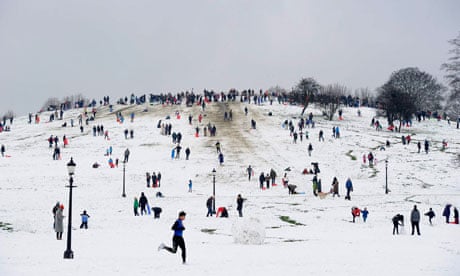
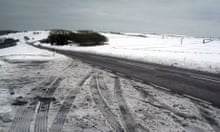
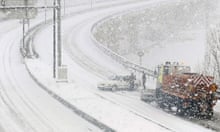

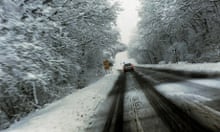



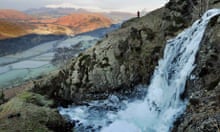
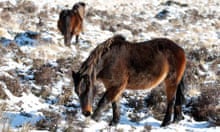
Comments (…)
Sign in or create your Guardian account to join the discussion